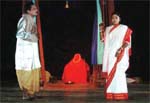 Iconic litterateur Sarat Chandra Chattopadhyay’s 76th death anniversary was observed through a memorial discussion and staging a theatre production based on the late writer’s novel Shorishi on Thursday at Experimental Theatre Hall of Bangladesh Shilpakala Academy.
Iconic litterateur Sarat Chandra Chattopadhyay’s 76th death anniversary was observed through a memorial discussion and staging a theatre production based on the late writer’s novel Shorishi on Thursday at Experimental Theatre Hall of Bangladesh Shilpakala Academy.
The programme was organised by Sanglap Group Theatre.
Founder of the troupe Rafiqul Alam, playwright and director Mostafa Hira and secretary general of Bangladesh Group Theatre Federation Jhuna Chowdhury spoke at the commemorative programme.
Following the discussion session, artistes of Sanglap Group Theatre staged the 25th show of Shoroshi, adapted and directed by Mostafa Hira.
Narrating the pains of maids at the temples expressed as shebadashi, the play depicts the double standard of the powerful quarters of the society.
The protagonist of the play, Shoroshi, the chief shebadashi at the Nat Mandir (temple), takes a strong stance and protests the hypocritical high-ups of the society who in association with the priest of the misuse the temple and its wealth for their personal interests.
Mostafa Heera, director of the play, tried to represent a picture of the early 20th century India. Zunaed Yousuf created a suggestive temple on the stage. He even used an actual tulsi tree as part of his set design.
Azmiri Sultana Lucki enacted the role of the main character, while Habibur Rahman, Walid Ahmed, Shatil Ahmed, Mainul Islam, Tamanna Meher Popi, Rajib Mandal, Kudrat-i-Khuda of Sanglap Group Theatre acted in the play.
‘Shoroshi gives us the image of not only the past but also the present. In my play, I have tried to portray the telling image of the literary work,’ said Mostafa Hira.
‘There are many works of Sarat Chandra that can be made into successful theatre productions. Playwrights and directors of the country should go forward to bring Sarat Chandra on stage,’ said Masud Alam Babu, general secretary of Sanglap Group Theatre. One of the most popular Bangali novelists Sarat Chandra Chattopadhyay was born in Debanandapur, Hooghly in 1876 and died on January 16, 1938. His works represent rural Bangali society often with scathing exposure of social superstitions and oppression. His major works include Boro Didi, Palli Samaj, Devdas, Charitrahin, Srikanta, Datta, Dena Paona and many others.
-With New Age input




















